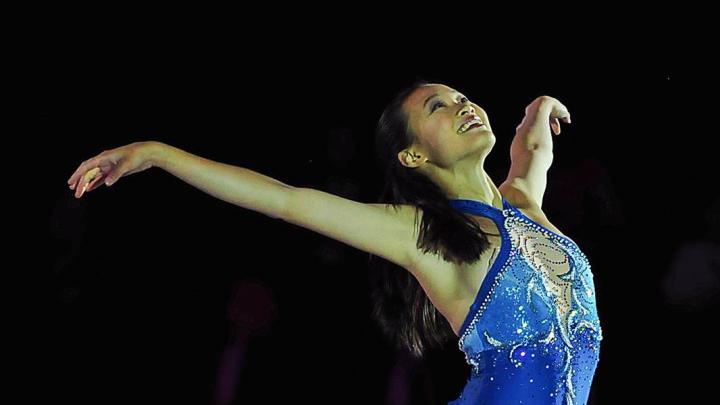Christina Gao ’16-17 used to be a skater first, a student second. Ever since her parents signed her up for figure-skating lessons at age seven, her life has been as much of a balancing act as the sport itself. Growing up, the slender girl from Cincinnati often missed school to make time for her training sessions in Kentucky. In high school, Gao moved with her father to Toronto, where she could take advantage of the longer ice time to train.
By the time Gao came to Harvard in 2012, she had already won numerous awards at the national and world level, and was declared an Olympics hopeful. And so, she juggled a full course load and a rigorous training regime. Every day, she would wake at 6:30 for three hours of training, attend classes, and engage in an extra hour of off-ice physical exercise afterwards—a schedule that left little time for extracurriculars. Being a competitive athlete also meant Gao missed out on the social aspect of her Harvard experience, said Harrison Choate ’17, a friend and fellow skater who has trained with her. “In college, you get to know people at 4 a.m., when you’re working late on a problem set in the dining hall,” he said. “But she had to be in bed early in order to train in the morning.”
Upon finishing her first semester, Gao made a major decision: take a yearlong leave to train full-time. It was an attempt to seize a once-in-a-lifetime opportunity: to qualify for the team representing the United States in the 2014 Sochi Olympics. “I will never [again] be able to put my life on pause and just focus on skating for a year,” she recalled thinking. By the time she stepped into the rink of the qualifying competition for the Olympics team, where three skaters were to be picked out of 20, she was in her best shape ever. “I trained really hard, did everything to a T.”
But her Olympic dream was shattered the moment she lost her balance and fell while executing a triple flip—and she knew it was over. Looking back, she cannot explain exactly what went wrong, except to point out that “ice is slippery”—a fact that makes figure skating both exciting and unpredictable. Choate, who was watching Gao, felt “devastated” by her underperformance at the most critical junction of her skating career. “I was screaming,” he said. “It was really hard to watch, because she had never looked better in her entire life.”
Gao dealt with this blow with remarkable maturity and aplomb. She recovered quickly, Choate said, and soon found herself comforting other younger skaters who did not make the team. “The whole family was really sad, but she was mentally strong and not depressed,” said her sister, Caroline Gao. After all, she would be departing for Harvard in a month—“a good distraction,” in Gao’s mind, from her unsatisfactory result.
Many thought that result marked the end of Gao’s skating career. But instead of leaving a permanent scar, her failure inspired the feeling that she had more to achieve in the sport. One semester later, despite objections from those around her, she decided to leave Harvard for a second time to compete in one last season “just for the joy of it.” Where there was pressure, she replaced it with pleasure. Gao doesn’t remember her placements that season—in any case, they were not important anymore—but she does remember how it rekindled her deep passion for a sport that very much defined her childhood and youth.
This was Gao’s “personal redemption,” Choate said—she was determined not to end her skating career with tears of disappointment. In the end, her final season ended on a high note, and she shed tears of joy upon completing her program at the 2015 U.S. Championships. “In both years, she was wearing a white dress—it was a nice parallel,” Choate recalled.
With her skating career now officially closed, Gao is diving into the full range of experiences Harvard has to offer, as if she is starting college all over again: “There is a lot more to life than skating.” She is busy meeting new people, joining new clubs, and exploring new interests (this summer, she is an intern at a California bank).
Her work ethic aside, friends say Gao is marked by an infectious positive energy, able to make others laugh and not take herself too seriously. Looking back at her 14-year-long athletic career, she harbors no bitter feelings. “I’m just happy with how everything happened,” she said. “I did everything I could in the sport, and I feel really good about it.”








